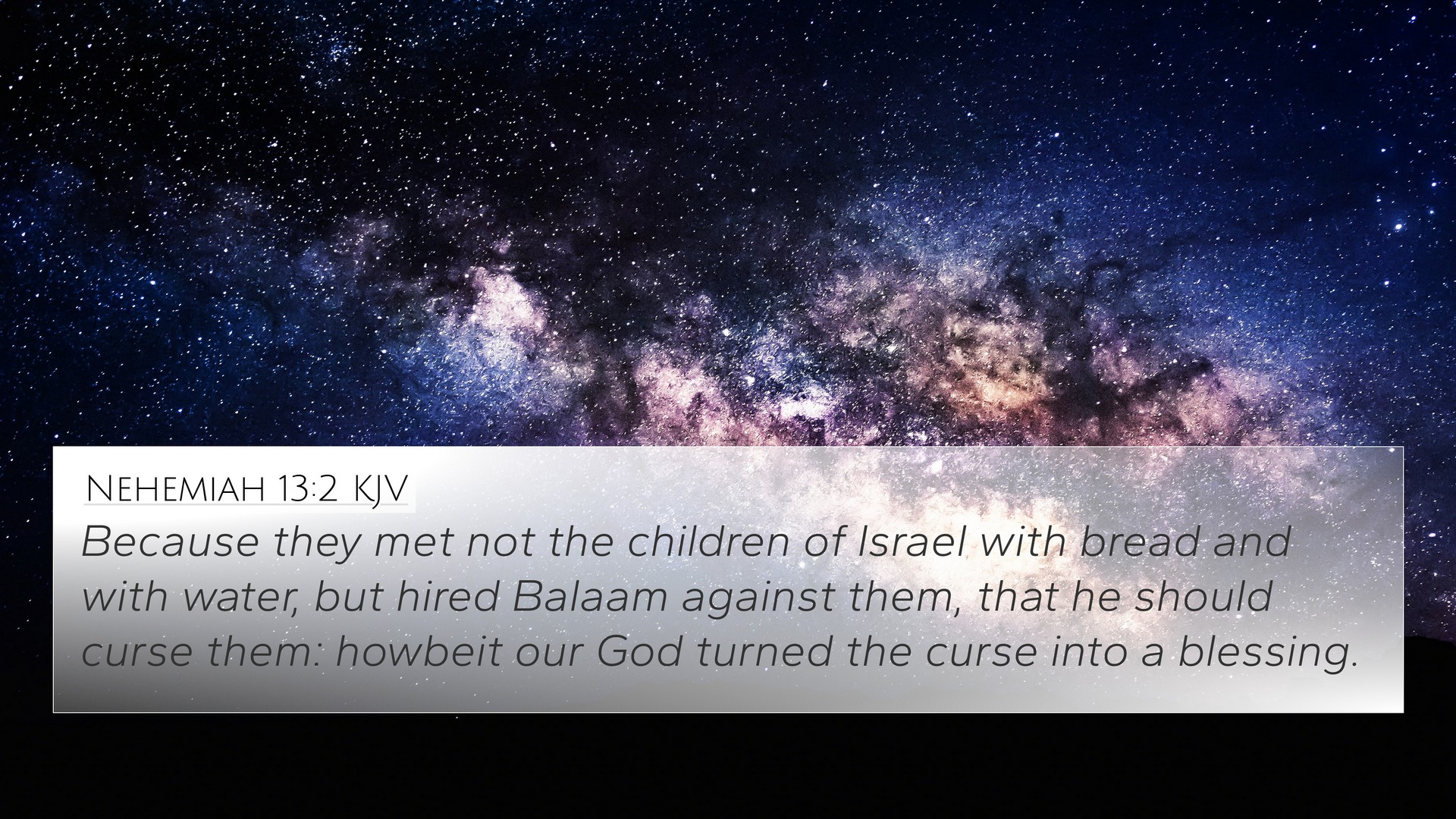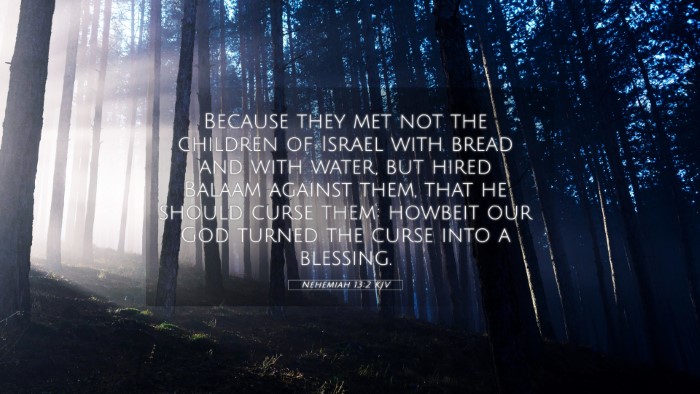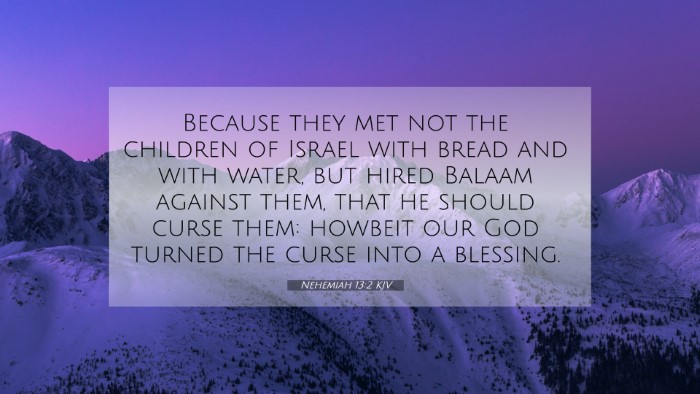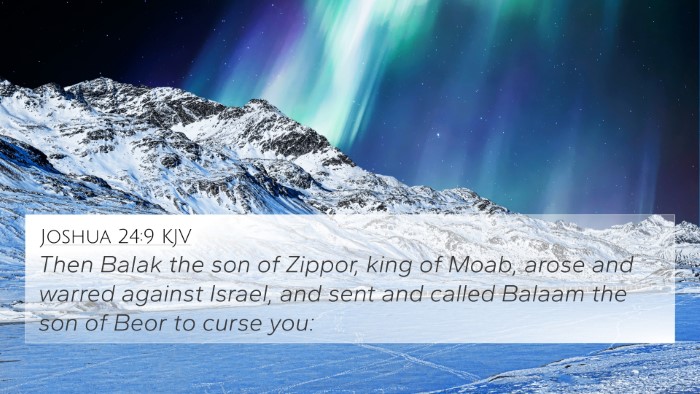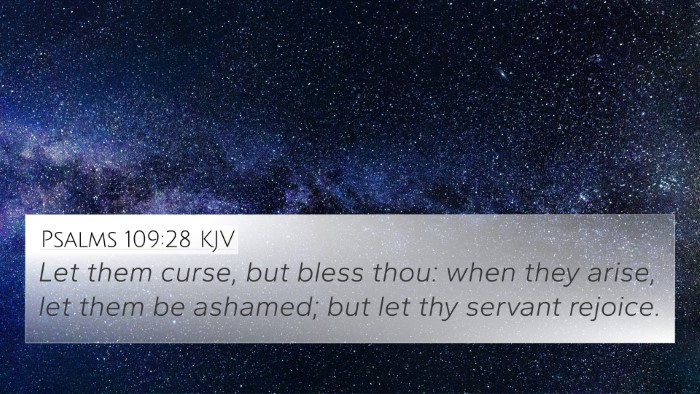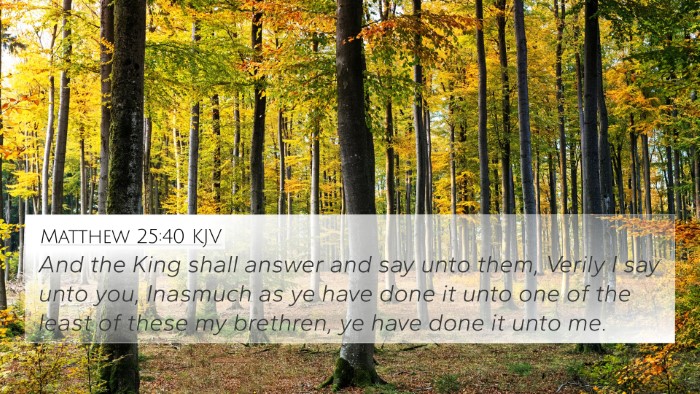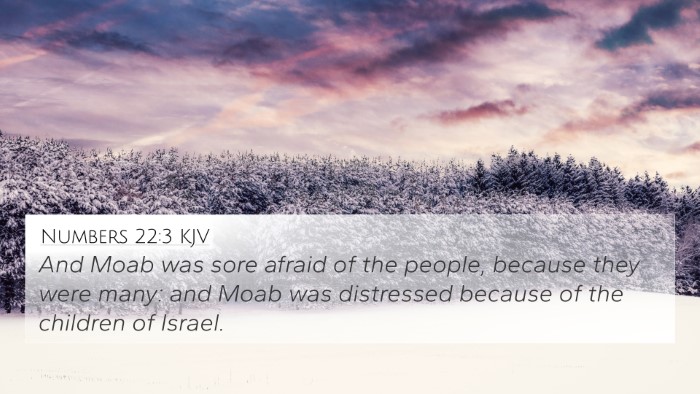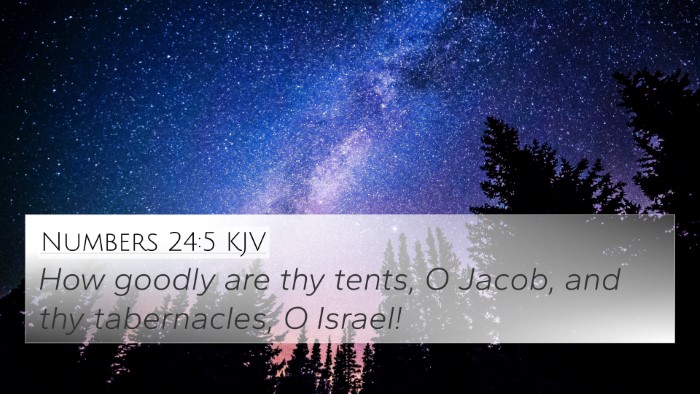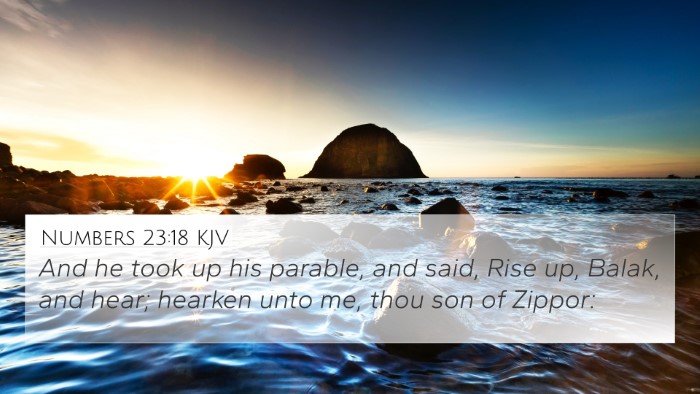Understanding Nehemiah 13:2
Nehemiah 13:2 states, "Because they met not the children of Israel with bread and with water, but hired Balaam against them, that he should curse them: howbeit our God turned the curse into a blessing." This verse encapsulates a significant moment in the history of the Israelites, emphasizing God's providence in their deliverance despite the adversities they faced.
Summary of Biblical Meaning
In this verse, Nehemiah reflects on how the Moabites, through cunning and deceit, sought to hinder the progress of God's chosen people. Balaam, a prophet for hire, was recruited to pronounce a curse upon Israel. Yet, God's sovereignty prevailed as he transformed the intended curse into a blessing. This passage illustrates several profound themes including God’s protection, the futility of opposing His plans, and the overarching principle that God can bring good out of evil intentions.
Thematic Insights from Commentaries
- Matthew Henry: Highlights the persistent hostility of Moab toward Israel. Henry emphasizes that no matter the schemes of men against God's people, His will prevails. He notes the importance of relying on divine providence rather than human strength or solutions.
- Albert Barnes: Focuses on the nature of Balaam's character and the overarching lesson of divine control over human motives. Barnes suggests that Balaam's initial intent was thwarted by God's intervention, emphasizing the futility of using human means for divine ends.
- Adam Clarke: Discusses the historical context of this verse, linking it to Israel's journey and highlighting God’s faithfulness. Clarke elaborates on the term "blessing" used here, suggesting it signifies not just physical well-being but spiritual enrichment.
Bible Verse Cross-References
Nehemiah 13:2 provides rich connections to other scriptures that deepen our understanding of its message:
- Balaam's Story: Numbers 22-24 - These chapters detail the circumstances surrounding Balaam's attempts to curse Israel and how God intervened.
- God's Sovereignty: Proverbs 21:30 - "There is no wisdom, nor understanding, nor counsel against the Lord." This verse echoes the theme that human schemes cannot override God's purpose.
- Blessings and Curses: Deuteronomy 30:19-20 - This passage emphasizes God's call for Israel to choose life and blessings over death and curses, reinforcing the eventual triumph of divine plans.
- Divine Protection: Psalm 91:7-10 - It reassures believers of God's protection against dangers, connecting well with the idea of God turning curses into blessings.
- Faithfulness of God: Romans 8:28 - "And we know that all things work together for good to them that love God," which parallels the core message of Nehemiah 13:2.
- Opposition of God’s People: Isaiah 54:17 - "No weapon that is formed against thee shall prosper" reflects the assurance that divine plans are unbreakable despite opposition.
- God's Blessings: James 1:17 - "Every good gift and perfect gift is from above," which emphasizes the source of blessings amid adversity.
- Intent of the Heart: Jeremiah 17:9-10 - Addresses the deceitfulness of the heart and God's discerning nature, connecting to Balaam’s intentions.
- Desire for Blessing: Genesis 12:3 - "I will bless those who bless you, and him who dishonors you I will curse." A direct connection that shows God's commitment to Israel.
- Example of Deliverance: Exodus 14:13-14 - Moses tells the Israelites that the Lord will fight for them, highlighting deliverance against all odds.
Connections Between Bible Verses
This verse can be cross-referenced with several others that showcase the character of God in delivering His people. Notable connections include:
- God's Control Over Nations: Psalm 22:28, which asserts that God is sovereign over all the earth.
- Nehemiah's Leadership: Nehemiah 4:14 showcases Nehemiah's faith and rallying of the people, paralleling God's ultimate protection.
- Deliverance from Enemies: 2 Chronicles 20:15, where God reassures His people that the battle is His, reinforcing the theme found in Nehemiah.
Tools for Bible Cross-Referencing
When studying Nehemiah 13:2, it can be beneficial to utilize various tools for Bible cross-referencing. Some helpful resources include:
- Bible Concordance: A comprehensive alphabetical index of words and phrases that appear in the Bible, useful for locating specific verses related to themes.
- Bible Cross-Reference Guide: A structured system that links related verses across both Testaments, simplifying thematic study.
- Cross-Reference Bible Study: Modular resources that allow for deeper exploration of related texts, highlighting parallels and contrasts.
- Comprehensive Bible Cross-Reference Materials: These can include commentaries, study Bibles, or apps that visually represent the relationships between various scriptures.
How to Use Bible Cross-References
Understanding how to identify connections between different scriptures can enhance one’s study of Nehemiah 13:2. Here are some steps on how to use Bible cross-references effectively:
- Start with a key verse, such as Nehemiah 13:2.
- Consult a Bible concordance to find words or themes that lead to related verses.
- Explore the context of each cross-reference to see how it complements or contrasts with your primary verse.
- Consider thematic connections—what broader spiritual principles do the linked verses suggest?
- Document your findings and reflect on how these cross-references inform your interpretation of the main verse.
Concluding Thoughts
Nehemiah 13:2 serves as a powerful reminder of God’s unchanging nature and His ability to turn negative intentions into positive outcomes. By utilizing various Bible cross-reference systems, believers can deepen their understanding of how interconnected the scriptures are, further enriching their faith journey. Whether one engages in comparative Bible verse analysis, or is seeking Bible verses that relate to each other, Nehemiah's assertion about God's faithfulness gives hope and encouragement amidst life's challenges.
